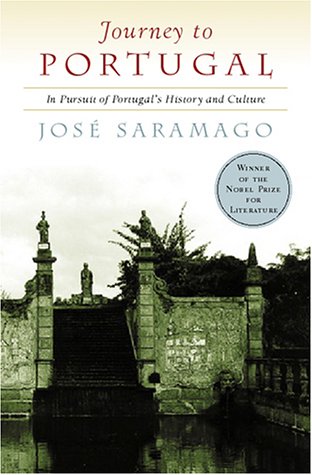Source: Public Library
Hardcover, 464 pages
I am an Amazon Affiliate
Journey to Portugal: In Pursuit of Portugal’s History and Culture by José Saramago, translated by Amanda Hopkinson and Nick Caistor from Portuguese, is a travelogue, but not in a traditional sense of naming specific destinations, their locations, and offering impressions in a straightforward manner. Readers looking for a travel guide would be best served looking for another book about Portugal. Saramago refers to himself as the traveler, which can be wearisome throughout 400 pages of text, and many of the visits he makes throughout the country are to either museums or religious locations/buildings, which is odd given his atheism and tenuous relationship with the Catholic church after writing The Gospel According to Jesus Christ. Moreover, this travelogue is as close to being a memoir as it can be given Saramago’s reflections, daydreams, and observances about the more modern Portugal around him. (He exiled himself, a Communist, to the Spanish island of Lanzarote following The Carnation Revolution in 1974 where he remained until his death in 2010.) However, he does say that he wishes these religious relics and pieces to be preserved as works made by human hands.
“The traveller thanks him, and sets off in the direction indicated. There the palheiros survive, huge barracks made of wooden slats blackened by the wind and the sea, a few already stripped beams exposed to the gaze. A few are still inhabited, others have lost their roofs to the wind. It won’t be long before nothing will remain beyond a photographic record.” (page 146)
In many ways, Saramago is reflecting on the life he’s led, the perceptions he’s had and still has, and how as time moves on the ornaments of those memories and perceptions are stripped bare, leaving only the barest outline of the past — until the emotions and personal connections are lost and all that is left is a photo out of context. “During the lengthy voyage that took nearly six months, the conviction was born in me that in every place I passed through there was a piece of old Portugal bidding farewell to the traveller I was, an ancient Portugal which was beginning, finally, while still doubting whether it wanted to or not, to move towards the twentieth century,” he says. (page xii) He reconciles the past with the present, as seen through a melancholy perspective, and like the villages and people the traveller approaches slowly, he passes through one town to another, gets lost, and meditates on what he encounters.
Saramago reflects on stonework quite a bit and its ability to stand the test of time, and through his ruminations, readers are likely to see his struggle with the endurance or inability of workers and tributes to stand the test of time — there are some shrines and other edifices he finds hold stories that are no longer accessible. Journey to Portugal: In Pursuit of Portugal’s History and Culture by José Saramago, translated by Amanda Hopkinson and Nick Caistor, may suffer from poor translation, but there are moments of great reflection and insight that shouldn’t be missed, even if they are mired in melancholia and dark moods, by patient readers.

José de Sousa Saramago is a Nobel-laureate Portuguese novelist, playwright and journalist. He was a member of the Portuguese Communist Party. His works, some of which can be seen as allegories, commonly present subversive perspectives on historic events, emphasizing the human factor rather than the officially sanctioned story. Saramago was awarded the Nobel Prize for literature in 1998. He founded the National Front for the Defense of Culture (Lisbon, 1992) with among others Freitas-Magalhaes. He lived on Lanzarote in the Canary Islands, Spain, where he died in June 2010.






